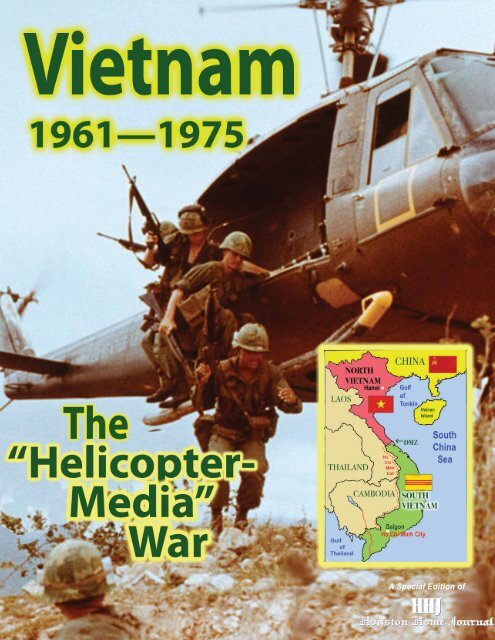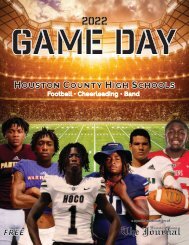Create successful ePaper yourself
Turn your PDF publications into a flip-book with our unique Google optimized e-Paper software.
A Special Edition of
The Shaheen &<br />
Kiefer families<br />
would like to<br />
recognize<br />
and honor those<br />
who unselfishly<br />
served our<br />
country<br />
P<br />
W<br />
In memory of<br />
Chuck Shaheen, Jr.<br />
Arthur Kiefer<br />
Tom Martinez
Proud of Our Country. Proud of Our Military!<br />
We celebrate the men and women of the Armed Forces of the United<br />
States for their sacrifi ce, courage and dedication to this country.<br />
As a special thanks we would like to extend<br />
the following special offer to all active-duty<br />
and retired military personnel .<br />
$75 for 1 year Subscription!<br />
Simply present this savings pass and<br />
your military ID or proof of service<br />
to receive your discount OR email to:<br />
kerriw@hhjnews.com<br />
• 1210 Washington St., Perry • 478-987-1823
<strong>2022</strong><br />
C O N T E N T S<br />
published by<br />
HOUSTON HOME JOURNAL<br />
A division of the Dublin Courier<br />
Herald Publishing Company<br />
1210 Washington Street<br />
P.O. Box 1910<br />
Perry, GA 31069<br />
478-987-1823<br />
www.hhjonline.com<br />
PUBLISHER<br />
Cheri Adams<br />
cadams@hhjnews.com<br />
ADVERTISING<br />
Lori Kovarovic,<br />
Advertising Manager<br />
lorik@hhjnews.com<br />
Nathan Mathis<br />
nmathis@hhjnews.com<br />
WRITERS<br />
Will Oliver • Managing Editor<br />
woliver@hhjnews.com<br />
Brieanna Romero<br />
bromero@hhjnews.com<br />
Tyler Meister<br />
tylerm@hhjnews.com<br />
CREATIVE<br />
Kayley Trischan<br />
Angela Barentine<br />
6 <strong>Vietnam</strong><br />
10<br />
12<br />
14<br />
15<br />
17<br />
19<br />
22<br />
Walter Parker<br />
Bob Bovitch<br />
16<br />
18<br />
20<br />
Aubrey Mitchell<br />
Bill Carey<br />
Ernest Cooling<br />
David Wilson<br />
Romeo Group<br />
Timothy Bollinger<br />
Tom McLendon<br />
Avery Chenoweth<br />
A Special Edition of
We Support Our <strong>Veterans</strong>!<br />
Perry Drug Company<br />
Your hometown pharmacy.<br />
1036 Macon Rd, Perry • www.perrydrugcompany.com<br />
GLORIFYING GOD THROUGH QUALITY AND COMPASSIONATE CARE.<br />
LIFESPRING SALUTES OUR VETERANS.<br />
Jacob’s House<br />
Supportive short term care<br />
• State-of-the-art Rehabilitation Facilities<br />
• Private Rooms with Private Baths<br />
• Private Dining Rooms<br />
• Orthopedic Recovery & Strengthening<br />
• Cardiac Recovery<br />
• Post Stroke/Nuerological Recovery<br />
Church Home<br />
A legacy of nursing home care<br />
• Health Monitoring and Medication Management<br />
• Physical, Occupational, Speech, and Restorative Therapies<br />
• Nutrition Monitoring and Management<br />
• Activities/Social Programming<br />
Grace Garden<br />
Meaningful memory care<br />
• Projected Opening late Summer 2023<br />
• Early to Middle Stage Dementia Care<br />
• Evidence-based design for a homelike feel<br />
• Enabling independence and well-being of those living with dementia<br />
2470 US Highway 41 North<br />
Fort Valley 6 miles north of Perry<br />
on US Hwy 41 near GA 96<br />
Schedule a Personalized Tour! @ChurchHomeLifespring<br />
478.987.1239 ChurchHomeLifespring.com
6<br />
on
from pot to pure heroin were available<br />
everywhere and accounted for much of the<br />
disorder and chaos. (Many enemy forces drugged<br />
their fighters to maintain control, eliminate fear,<br />
and make them impervious to cold: the Nazis had<br />
fed methamphetamines to their troops fighting at<br />
Moscow; Arab fighters in Iraq later were so<br />
hopped up that they fought even when their limbs<br />
were blown off! U.S. troops in <strong>Vietnam</strong> were<br />
simply drugged euphoric and useless)<br />
Unspeakable atrocities (MyLai massacre) were<br />
also perpetrated by U.S. troops. Only the Marine<br />
divisions’ superior discipline prevailed over<br />
disobedience. One US Navy ship almost suffered<br />
mutiny! Oliver Stone’s movie Platoon captured<br />
this war realistically.<br />
Warfare in <strong>Vietnam</strong> was far different from<br />
previous wars: there was no “Front,” or Main<br />
Line of Resistance (MLR); acquiring territory was<br />
of no significance, only isolated Fire-bases, and<br />
360-degree Tactical Areas of Opportunity<br />
(TAORs). Suspected remote enemy areas were<br />
swept by rapid helicopter “Inserts.” Both the Viet<br />
Cong guerrillas and the NVA (North <strong>Vietnam</strong>ese<br />
Army) organized units were phantom-like in the<br />
dense jungles; there were no major unit-vs-unit<br />
clashes, only hidden and quick ambushes, intense<br />
gun fire exchanges against invisible enemies. The<br />
enemy logistical chain was a wide “Ho Chi Minh”<br />
foot-trail under a jungle canopy in Laos and<br />
Cambodia paralleling the western border of South<br />
<strong>Vietnam</strong>, which U.S. air forces bombed<br />
continually and full-scale incursions (deliberately<br />
mis-labelled “Invasions” by the hostile press)<br />
severed it temporarily from time to time.<br />
The biggest change was that <strong>Vietnam</strong> was<br />
mostly a helicopter war—at first small, sevenpassenger<br />
helos, then larger, rapid transport, up,<br />
over, and quick insert, firefights, and retraction—<br />
mostly under unseen enemy fire. Close-air<br />
support from hi-speed jet aircraft incinerated large<br />
areas with napalm, as fighter-bomber jets dodged<br />
Soviet-made SAM (surface-to-air missiles) while<br />
tangling with Soviet-piloted enemy MiGs higher<br />
up. Giant U.S. B-52 bombers wreaked havoc over<br />
battlefields and the enemy capital, Hanoi.<br />
(Captured American prisoners-of-war were<br />
brutally imprisoned and tortured at the so-called<br />
“Hanoi Hilton” there.)<br />
Gone were the WW2 Garand M-1 .30-calibre<br />
rifle and carbine, replaced by the M14 NATO<br />
7.62mm, 20-round, automatic rifle, until it was<br />
replaced in 1967 by the lighter, semi-automatic,<br />
20-round M16 5.56mm. rifle; 7.62mm. automatic<br />
and semi-automatic M60, M240, and M249<br />
weapons replaced the WW2 .30-cal. BARs and<br />
machine guns. Exception: the same ol’ 1911 Colt .<br />
45s, replaced afterwards by 9mm Berettas. Bulletproof<br />
Flak jackets were now personal gear.<br />
Canned “C” rations were replaced with dried (add<br />
water), packaged “Meals-Ready-to-Eat.” Light<br />
combat uniforms were geared for the climate,<br />
dried quickly, and the boots were meshed and<br />
cool (and wet!). Cloth camouflaged helmets were<br />
the same as WW2.<br />
The large 1st and 3 rd Marine, 28-thousand-man,<br />
divisions and their two air wings were posted in<br />
the I Corps sector just below the DMZ separating<br />
the South from the North to prevent an NVA<br />
invasion. There, they sustained intense enemy<br />
artillery bombardment and incursions—as at Khe<br />
Sanh—from NVA organized ground units.<br />
Offshore, Navy-Marine LPH (Helicopter carriers)<br />
launched Marine Special Landing Forces to flush<br />
out enemy from the DMZ and other isolated<br />
targets with coordinated inserts and close-air<br />
napalm attacks. The Navy also conducted river<br />
patrols assisting Army units farther south.<br />
In 1968, the enemy launched the so-called “Tet<br />
Offensive” throughout South <strong>Vietnam</strong> that took<br />
all South <strong>Vietnam</strong>ese and U.S. forces by surprise.<br />
However, despite the media’s negative reporting<br />
about the U.S. suffering a staggering defeat, to the<br />
contrary, all of the NVA and VC elements were<br />
quickly disposed of.<br />
Remembering<br />
Eventually after nine years, in 1973, the U.S.<br />
pulled its forces out, leaving only advisors to<br />
assist the South to conclude the dwindling war.<br />
The following year, however, North <strong>Vietnam</strong><br />
Premier Ho Chi Minh seized the opportunity and<br />
had his army invade and 11/14/43 completely - conquer 7/3/08<br />
South <strong>Vietnam</strong> and change the Capital, Saigon, to<br />
“Ho Chi Minh City”! The 1975 lasting image of<br />
the debacle of American helicopters lifting frantic<br />
embassy and other remnant U.S. personnel off the<br />
roof of the abandoned American Embassy, trying<br />
to evacuate them, undercuts that of the heroic<br />
raising of the flag on Iwo Jima in WW2, when the<br />
U.S. had been an invincible power. (The same<br />
frantic Afghanistan withdrawal repeated in 2021!)<br />
Retired<br />
SMSgt Robert N. Bemis<br />
Nor had any U.S. wars been so vociferously or<br />
treasonously opposed! The untoward emergence<br />
of the “Hippie Revolution” in 1969 in a large<br />
gathering of anti-war youths at Woodstock, NY, in<br />
a mass orgy of anti-war protests, drugs,<br />
promiscuous sex, fueled outright defiance of law<br />
and order and defilement of American flags.<br />
TOWING OF PERRY
ilable<br />
of the<br />
rugged<br />
e fear,<br />
is had<br />
ting at<br />
ere so<br />
limbs<br />
were<br />
eless)<br />
were<br />
arine<br />
over<br />
ffered<br />
ptured<br />
from<br />
Main<br />
ry was<br />
s, and<br />
tunity<br />
were<br />
e Viet<br />
amese<br />
in the<br />
vs-unit<br />
intense<br />
s. The<br />
Minh”<br />
s and<br />
South<br />
mbed<br />
erately<br />
press)<br />
m was<br />
sevenrt,<br />
up,<br />
tion—<br />
se-air<br />
d large<br />
odged<br />
while<br />
higher<br />
c over<br />
anoi.<br />
were<br />
-called<br />
calibre<br />
NATO<br />
it was<br />
matic,<br />
8<br />
20-round M16 5.56mm. rifle; 7.62mm. automatic<br />
and semi-automatic M60, M240, and M249<br />
weapons replaced the WW2 .30-cal. BARs and<br />
machine guns. Exception: the same ol’ 1911 Colt .<br />
45s, replaced afterwards by 9mm Berettas. Bulletproof<br />
Flak jackets were now personal gear.<br />
Canned “C” rations were replaced with dried (add<br />
water), packaged “Meals-Ready-to-Eat.” Light<br />
combat uniforms were geared for the climate,<br />
dried quickly, and the boots were meshed and<br />
cool (and wet!). Cloth camouflaged helmets were<br />
the same as WW2.<br />
The large 1st and 3 rd Marine, 28-thousand-man,<br />
divisions and their two air wings were posted in<br />
the I Corps sector just below the DMZ separating<br />
the South from the North to prevent an NVA<br />
invasion. There, they sustained intense enemy<br />
artillery bombardment and incursions—as at Khe<br />
Sanh—from NVA organized ground units.<br />
Offshore, Navy-Marine LPH (Helicopter carriers)<br />
launched Marine Special Landing Forces to flush<br />
out enemy from the DMZ and other isolated<br />
targets with coordinated inserts and close-air<br />
napalm attacks. The Navy also conducted river<br />
patrols assisting Army units farther south.<br />
In 1968, the enemy launched the so-called “Tet<br />
Offensive” throughout South <strong>Vietnam</strong> that took<br />
all South <strong>Vietnam</strong>ese and U.S. forces by surprise.<br />
However, despite the media’s negative reporting<br />
about the U.S. suffering a staggering defeat, to the<br />
contrary, all of the NVA and VC elements were<br />
quickly disposed of.<br />
Eventually after nine years, in 1973, the U.S.<br />
pulled its forces out, leaving only advisors to<br />
assist the South to conclude the dwindling war.<br />
The following year, however, North <strong>Vietnam</strong><br />
Premier Ho Chi Minh seized the opportunity and<br />
had his army invade and completely conquer<br />
South <strong>Vietnam</strong> and change the Capital, Saigon, to<br />
“Ho Chi Minh City”! The 1975 lasting image of<br />
the debacle of American helicopters lifting frantic<br />
embassy and other remnant U.S. personnel off the<br />
roof of the abandoned American Embassy, trying<br />
to evacuate them, undercuts that of the heroic<br />
raising of the flag on Iwo Jima in WW2, when the<br />
U.S. had been an invincible power. (The same<br />
frantic Afghanistan withdrawal repeated in 2021!)<br />
Nor had any U.S. wars been so vociferously or<br />
treasonously opposed! The untoward emergence<br />
of the “Hippie Revolution” in 1969 in a large<br />
gathering of anti-war youths at Woodstock, NY, in<br />
a mass orgy of anti-war protests, drugs,<br />
promiscuous sex, fueled outright defiance of law<br />
and order and defilement of American flags.<br />
From their collective mental<br />
derangement, began the Hippies’ ultimate<br />
undermining of U.S. society by ignorantly<br />
spouting Marxist-socialist ideology, which they<br />
inflicted on universities first by “sit-ins” in Dean’s<br />
offices—defying expulsion, burning draft cards<br />
and some fleeing to Canada—all gleefully<br />
captured by sympathetic media. Soon this began<br />
to wreak havoc with society and the “American<br />
Way,” as well as the military. Instead of being<br />
challenged, the Hippie ilk’s goal of communism<br />
replacing the U.S Constitutional Republic was<br />
eventually achieved by their infiltrating academia<br />
for the next four decades with socialist teachers<br />
and professors lowering U.S. education to 28 th<br />
place in the world. And, to top it off—now, in<br />
<strong>2022</strong>—the U.S. is suffering their further<br />
imposition of insidious, destructive Woke poisons<br />
of CRT, Cancel Culture, 1619 Project, BLM,<br />
Antifa, et al., permeating society, commerce,<br />
academe, and even the military.<br />
The hostile Media: <strong>Vietnam</strong> occurred during the<br />
advent of world-wide television (decades before<br />
the digital age), so little wonder that the Press<br />
leapt at the chance to be first to fully cover war in<br />
real-time and send it back to home TVs as people<br />
were sitting down to dinner, horrifying and<br />
turning them against the war. Furthermore, this<br />
gave droves of narcissistic neophytes a chance to<br />
make their marks and become famous and highly<br />
paid. Untutored in things military, empty-headed,<br />
and with liberal chips on their shoulders against<br />
war and the U.S. military, they slanted events,<br />
skirted the truth and filed their jaundiced reports:<br />
among the worst: Canadian Morley Safer and<br />
Walter Cronkite for CBS, Peter Jennings for<br />
NBC, Peter Arnett, David Halberstam, Mike<br />
Wallace, Dan Rather, Marguerite Higgins, and<br />
hordes of untrained newbies.<br />
I twice volunteered for active duty as a<br />
Marine Reserve LtCol for the History division<br />
and billeted myself in Da Nang in the “I” Corps<br />
sector below the DMZ at the Combat Information<br />
Bureau (CIB), where I met and discoursed with<br />
many of these professional and not-so<br />
professional media reps, and, I too, accompanied<br />
Marine jungle patrols and firefights (the absolute<br />
safest place to be in combat is in a Marine unit<br />
because they’ll never leave you behind!)<br />
Thus, from my own military experience<br />
knowledge, I can judge and refute much of what<br />
the me<br />
victor<br />
kick,<br />
forme<br />
they c<br />
genera<br />
White<br />
advice<br />
Vietna<br />
war;<br />
egotis<br />
War, J<br />
Richa<br />
conclu<br />
U.S. p<br />
in fall<br />
milita<br />
most<br />
comm<br />
the m<br />
into a<br />
once<br />
of the<br />
free S<br />
lose a<br />
for its<br />
58,156<br />
Marin<br />
and th<br />
Twen<br />
Vietn<br />
Milit<br />
accept<br />
U.S.<br />
invade<br />
Kuwa<br />
and th<br />
battlef<br />
colone<br />
Chero<br />
into K<br />
The A<br />
over!<br />
milita<br />
Air Fo<br />
(1,883
tal<br />
ate<br />
ntly<br />
they<br />
an’s<br />
ards<br />
ully<br />
egan<br />
ican<br />
eing<br />
ism<br />
was<br />
mia<br />
hers<br />
28 th<br />
, in<br />
ther<br />
sons<br />
LM,<br />
rce,<br />
the<br />
fore<br />
ress<br />
ar in<br />
ople<br />
and<br />
this<br />
e to<br />
ghly<br />
ded,<br />
ainst<br />
ents,<br />
orts:<br />
and<br />
for<br />
ike<br />
and<br />
as a<br />
sion<br />
orps<br />
tion<br />
with<br />
t-so<br />
nied<br />
lute<br />
unit<br />
ence<br />
hat<br />
the media misreported.<br />
Since the military was not achieving<br />
victory, President Lynden on Johnson and his sidekick,<br />
Secretary of Defense, Robert McNamara (a<br />
former Ford Company executive) decided that<br />
they could micro-manage the war better than the<br />
generals and admirals, so in the basement of the<br />
White House, rejecting professional military<br />
advice, they used a table-top relief model of<br />
<strong>Vietnam</strong> to orchestrate the military demise of the<br />
war; so ended the Johnson presidency. As the<br />
egotistical General MacArthur had in the Korean<br />
War, Johnson left as an abject failure. President<br />
Richard Nixon continued the war to its nonconclusive<br />
end and the humiliating evacuation of<br />
U.S. personnel from the American Embassy roof<br />
in fallen Saigon.<br />
There had been no way to measure<br />
military success except by enemy body counts—<br />
most of which were inflated to assuage higher<br />
command. By the end of ten years of warfare and<br />
the massive insertion of U.S. blood and treasure<br />
into a lost cause, nothing changed—except the<br />
once beautiful, peaceful countries and thousands<br />
of their warm, friendly inhabitants (North and<br />
free South) who suffered and died, ultimately to<br />
lose all to communism. All the U.S. had to show<br />
for its egregious errors was a casualty toll of<br />
58,156 American soldiers, sailors, airmen, and<br />
Marines killed and thousands more wounded—<br />
and the near demise of the U.S. Army.<br />
Twenty years later, the Gulf War would see<br />
<strong>Vietnam</strong> forgotten and a resurgence of the U.S.<br />
Military in weaponry, efficiency, public<br />
acceptance, and pride in service. Except, again the<br />
U.S. Army would fail—two Marine divisions<br />
invaded and liberated the oil rich country of<br />
Kuwait in 100 hours, before the first U.S. army<br />
and the foreign coalition forces ever reached the<br />
battlefield. I was again on active duty as a 62 y/o<br />
colonel for the History Division and drove a Jeep<br />
Cherokee behind the Marine attacking Task Force<br />
into Kuwait City and the cessation of hostilities.<br />
The Army arrived later after the shooting was<br />
over!<br />
Iraq? Afghanistan? And, now the U.S.<br />
military gone “WOKE”? West Point, Annapolis,<br />
Air Force Academy?<br />
My once glorious Marine Corps?<br />
Another Asian war—against China?<br />
God help us!<br />
(1,883words)<br />
ALTERNATE APPROACH<br />
MED CLINIC<br />
Warner Robins<br />
Saluting My<br />
Fellow <strong>Veterans</strong><br />
NOW OPEN<br />
Veteran Owned &<br />
Operated<br />
Discreet treatment for Erectile<br />
Dysfunction regardless of age or<br />
medical history.<br />
OUR GUARANTEE<br />
NO RESPONSE TO MEDICATION<br />
NO CHARGE!<br />
NO<br />
SIDE<br />
EFFECTS<br />
By Appointment Only<br />
478-334-2253<br />
or<br />
833-346-1773
Air Force - Master Sergeant<br />
Aubrey Mitchell<br />
After attending Blue Ridge Community College and<br />
finishing his two-year schooling, Aubrey Mitchell received a<br />
letter in the mail from the President stating the U.S. military<br />
had drafted him. Mitchell, a born and raised resident of<br />
Waynesboro, Virginia, had a decision to make.<br />
After consulting with his uncle that served in both<br />
the Army and the Air Force, Mitchell ended up deciding on<br />
the Air Force.<br />
“I spent 25 years in the Air Force; I thought I was<br />
going to only stay four years, and then I got<br />
married, so that made me decide to spend some<br />
time,” Mitchell said, laughing. “But after a while,<br />
things were going pretty good, so I decided to<br />
stay in 25 years.”<br />
His military service included deployments<br />
at McClellan Air Force Base in Sacramento,<br />
California, then <strong>Vietnam</strong>.<br />
During his year in <strong>Vietnam</strong>, he worked<br />
in guard towers with security police personnel.<br />
He said he and his unit had to keep their eyes<br />
out for pythons and panthers among other wildlife.<br />
“I was getting relieved, I guess it was about 10<br />
o’clock at night,” Mitchell said. “Here comes this<br />
big python up the ladder, and it just so happened<br />
one of the guys that was down there relieving me<br />
was used to getting snakes and skinning them.<br />
BY: WILL OLIVER<br />
So he came up and got the snake, took it back down and they took it to the<br />
dorms.”<br />
During his last day on post, he had to give up his permanent tower to be relocated<br />
to another post outside the main gate of the installation. He recalled<br />
this making him nervous, saying he knew of someone that was hit by a<br />
rocket after receiving his last paycheck right after stepping out of a building<br />
and planning to head stateside.<br />
“It seems like a lot of times, on your last day, something will happen,”<br />
he said.<br />
Following his departure from<br />
<strong>Vietnam</strong> and another station at<br />
McClellan, he was sent to Goose<br />
Bay, Labrador, and spent a year<br />
there. Following that, he went to<br />
Minot Air Force Base in North<br />
Dakota. He said one of his favorite<br />
deployments was his one-year<br />
stint in Greece. After Greece, he<br />
was stationed at Langley Air Force<br />
Base in Hampton, Virginia. At<br />
this point, he made a switch in<br />
occupation.<br />
“I was a cop in the Air Force<br />
for 13 years,” he said. “While I was<br />
at Langley, I changed jobs and<br />
went to school, became a telephone<br />
installer.”<br />
10<br />
H<br />
R<br />
s<br />
C<br />
G<br />
t<br />
s<br />
f<br />
H<br />
o<br />
K<br />
s<br />
t<br />
i<br />
w<br />
r<br />
t<br />
i<br />
i<br />
H<br />
A<br />
s<br />
“<br />
i<br />
i<br />
t
Day, Night, Weekend, and Online Classes | Free Tutoring<br />
Day, Night, Weekend, and Online Classes | Free Tutoring<br />
THANK YOU<br />
For<br />
THANK<br />
your service<br />
YOU<br />
For your service !<br />
His next station was<br />
Robins Air Force Base,<br />
serving with the 5th Mob,<br />
Combat Communications<br />
Group. Mitchell was sent<br />
to England after this and<br />
stayed for two years before<br />
returning to Robins.<br />
His unit completed work<br />
on the telephone cables at<br />
Kunsan Air Base in Gunsan,<br />
South Korea, since<br />
there were paper cables<br />
installed prior to his unit’s<br />
work of completely rearranging<br />
and reinforcing<br />
the communications system. He laughed, saying that whenever<br />
it rained, there was chaos over the radio with everybody listening<br />
to each other.<br />
He said his wife was able to visit during this time as well.<br />
A funny memory of his from his time in South Korea included<br />
signing liability waivers when they visited the DMZ.<br />
“Once we were there, they were giving us a briefing and told us<br />
if anything ever happened, we had to sign those papers saying<br />
that we weren’t going to make the military responsible; I<br />
thought it was a joke at first,” Mitchell said, chuckling. “A lot of<br />
times, North Koreans might try to<br />
escape and come to South Korea, and<br />
those guys up there will shoot at you.<br />
That’s why we had to sign the papers.”<br />
He even saw some time in Saudi<br />
Arabia during his military travels,<br />
serving with his unit as a telephone<br />
installer and maintaining communications<br />
systems.<br />
“I just had a joyous time in the military,”<br />
Mitchell said. “I look at it, and<br />
I say, ‘where else could I have been to<br />
be able to get trips like that to different<br />
countries and things like that?’”<br />
Retiring as a master sergeant, he<br />
worked at Robins Air Force Base in<br />
transportation for a few years before<br />
working 22 years with the U.S. Postal<br />
Service out of Macon.<br />
WE ARE A<br />
MILITARY WE FRIENDLY ARE A SCHOOL!<br />
MILITARY FRIENDLY SCHOOL!<br />
APPLY TODAY! gmc.edu<br />
APPLY TODAY! gmc.edu
Air Force - Technical Sergeant<br />
Walter Parker<br />
An Air Force veteran of “approximately 21 years,<br />
three months and 23 days,” Walter Parker was born in<br />
Crossville, Tennessee, on March 31, 1942. He and his family<br />
moved to Akron, Ohio, when he was 10 years old.<br />
“When I graduated from high school, I tried to<br />
find jobs around — Akron, Cleveland — [I] couldn’t, so I<br />
went into the Air Force and never looked back, never was<br />
sorry I joined the Air Force,” Parker said.<br />
In terms of education after high school and some<br />
military service, he received some additional credentials:<br />
a master’s in counseling and psychology from Ball State<br />
University, a bachelor’s from the University of Southern<br />
Mississippi and a Georgia Certified Public Manager Program<br />
certification from the state of Georgia.<br />
Parker enlisted in the Air Force on March 8, 1962<br />
in Akron, Ohio.<br />
“I had been wanting to be in the Air Force, my<br />
mother said, since I was 5 years old,” Parker said.<br />
He attended basic training and technical school<br />
before what was supposed to be his first overseas assignment<br />
in Araxos, Greece, in 1963. Although he was deployed,<br />
he said his particular assignment was not open yet.<br />
BY:<br />
WILL OLIVER<br />
Instead, he spent six months in Athens going to class for half a day and<br />
living in Glyfada where the Air Force Base was located.<br />
“Even though I was only an E-3, me and a friend of mine had<br />
a villa,” he said. “There were no military quarters on the Air Force Base;<br />
everybody lived off base.”<br />
From there, he was stationed in Araxos and quartered at the Greek<br />
Air Force basic training base.<br />
After finishing his assignment in Greece, he was sent back to the<br />
states to Shaw Air Force Base in Sumter, South Carolina. He then went to<br />
Fort Benning near Columbus, Georgia, for Jump School. He was sent to<br />
the Dominican Civil War crisis in 1965 and 1966, going in and out of Shaw<br />
AFB once he returned. Next came an 18-month assignment at Clark Air<br />
Base in the Philippines, and Parker met his wife, Eileen, there where she<br />
served as a schoolteacher. Eileen was a native of Cleveland, Ohio, serving as<br />
a teacher on the base for the Department of Defense. At the time, Clark was<br />
closest air base to <strong>Vietnam</strong>.<br />
The Parkers were married and went to Thailand for their honeymoon<br />
before heading back to Clark. Walter said it was interesting how<br />
he and Eileen met so far from home, yet both their parents only lived 30<br />
minutes away from one another.<br />
“I came back in on the 15th of December, was married on the 30th<br />
of December, went to Thailand and back with her for one week,” Parker<br />
said. “On the 15th of January, I was back in <strong>Vietnam</strong>.”<br />
Serving as what he called a “field rep,” he was an Air Force guy<br />
that worked closely with other Army personnel. He said he spent most of<br />
his time “wandering around in the field getting information to send back to<br />
Clark.”<br />
12
He said he made some great memories on Vung Chua Mountain near Qui Nhon, <strong>Vietnam</strong>.<br />
Next was STRIKE Command at MacDill Air Force Base in Tampa, Florida, where the couple lived for four years. They were sent to<br />
England, and he added that while they were there, he, Eileen and their two boys (at the time) made a trip from Land’s End, England, to John o’<br />
Groats, Scotland. After England, they came back to Altus, Oklahoma. Following a short stint in the recruiting service, he was stationed in Bessemer,<br />
Alabama. He was stationed at Brooks Air Force Base with the 6906th Electronic Security Squadron, specializing in work with technical<br />
intelligence vans before going back to Greece for a second time — this time, with a wife and three kids by his side.<br />
Parker retired from the Air Force on June 30, 1983 as a technical sergeant. After taking on various directions and endeavors over a<br />
number of years, Parker visited the Georgia Diagnostic and Classification Center in Jackson, Georgia, on a job lead.<br />
After finding<br />
out he was the only<br />
person in the state<br />
that applied for the<br />
job with appropriate<br />
qualifications, he got<br />
the position.<br />
After working<br />
for the state for 18<br />
years in a couple of<br />
different roles, he<br />
retired again before<br />
working once again<br />
with a methadone<br />
treatment center<br />
located on Highway<br />
247 for two years.<br />
From there, he retired<br />
“for good.”<br />
13
Army - Sergeant<br />
Bill Carey<br />
BY: TYLER MEISTER<br />
“You get scared, you<br />
get mad in the middle, and<br />
right at the end when you<br />
think something is going<br />
to happen, you get scared<br />
again,” Bill Carey said.<br />
Sgt. Bill Carey still has<br />
recordings of the nights he<br />
spent in <strong>Vietnam</strong>. Through<br />
the speakers of his cassette player, you can hear the<br />
crickets surrounding Nhatrang Air Base, gunfire and<br />
explosions popping off somewhere in the background.<br />
After a yearlong tour, and four years total in service,<br />
Carey returned home. The day he stepped back on Georgia<br />
soil, Buzz Aldrin and Neil Armstrong were taking<br />
humanity’s first steps on the moon.<br />
Carey is 75 years old, born in 1947. He enlisted<br />
in the Air Force when he was 18 years old, after being<br />
warned by his father not to enlist with the Army. He was<br />
21 when he was sent to <strong>Vietnam</strong>.<br />
“I was an old man,” Carey said. “I was one of the<br />
old guys.”<br />
Carey recalled the surroundings of Nhatrang.<br />
The base was bordered by the South China Sea. To the<br />
base’s left and right, a mountain and rice patties. When<br />
he first arrived, he was a personnel specialist, helping<br />
manage those coming in and out of the base and keeping<br />
records.<br />
“You don’t have to go out and wander through<br />
the woods and track down folks, stuff like that,” Carey<br />
said. “It was a good job.”<br />
It was not long after he arrived, however, that Carey came<br />
face to face with the dangers of being in country. From the mountain<br />
near the base, enemy soldiers dropped bombs into the base.<br />
While working as a personnel specialist, Carey would often wake at<br />
two or three in the morning to the sound of explosions.<br />
Carey said that he spent the first portion of his time on base<br />
scared, bombs and gunfire often waking him in the night. Eventually,<br />
he was removed from his personnel specialist job.<br />
“Overnight, I became a security policeman,” Carey said. “It<br />
turned out to be a real good job.”<br />
With his new job, Carey would watch the base from a 20-foot tower,<br />
offering security. Rather than being scared, Carey became angry. Awake<br />
during the base’s nightly attacks, he could now identify where incoming<br />
bombs were coming from and the general area of where they would land.<br />
Aside from the hardship that comes with being at war, Carey recalled New<br />
Years Eve, 1968, when he was in <strong>Vietnam</strong>. He called it “the most spectacular<br />
thing,” he has ever seen.<br />
It was from his watchtower that he was able to find full view, as,<br />
from a fenced-off island just off the coast, American soldiers hit pop flares<br />
off at the stroke of midnight, ushering in the new year with a bang.<br />
“They all go out there, hit the pop flare and the whole place lights<br />
up,” Carey said. “All these little things just go up into the air and then they<br />
have little parachutes to carry them down. G-I will find a way.”<br />
Carey spent the remainder of his time on base as a bus guard, and<br />
then, once again, as a personnel specialist. As his time “in country” began<br />
to come to a close again, the fear Carey first became acquainted with upon<br />
his arrival returned, as the time to come home came closer and closer.<br />
Carey finished his tour, returning home in July 1969. Like so many <strong>Vietnam</strong><br />
<strong>Veterans</strong>, he was told to change out of his fatigues before entering the main<br />
airport to avoid the protestors inside.<br />
Since returning, he has gotten his college degree, continued in a<br />
love for playing music and held a number of jobs, including announcing for<br />
drag races. He has worked in activism, advocating for veterans and has done<br />
several works remembering his lost and fallen brothers.<br />
14
Navy - Seaman<br />
Bob Bovitch<br />
BY: TYLER MEISTER<br />
Unlike many in Warner Robins, Seaman Bob Bovitch served in<br />
the United States Navy. Born in Pittsburgh, Pennsylvania, he joined when<br />
he turned 17 in 1964.<br />
“I had friends who were in my high school, who were already in<br />
the military,” Bovitch said. “They were going to <strong>Vietnam</strong>. My father took<br />
me to the Naval Reserve, and I got to sign in.”<br />
Bovitch would stay in the reserves until he was 18, while his<br />
brother was already enlisted, a seaman on the USS Bronstein.<br />
Bovitch grew to the age of 18, and helped moved his family<br />
down to Florida for work. While there, he got a phone call from his<br />
brother.<br />
“I realized he needed help,” Bovitch said. “I went to mom and<br />
said, ‘I’m going active duty.’ I went to the commander down in Miami,<br />
and I said, ‘sir, I’d like to go active duty.’”<br />
Weeks later, Bovitch climbed aboard the USS Bronstein in 1965,<br />
like his brother before him. He worked on the mess decks for around<br />
a week before signing up for the ship’s radar unit, the same unit as his<br />
brother. Bovitch slept in bunk three. His brother slept in bunk two. The<br />
USS Bronstein, however, would not be Bovitch’s final destination.<br />
“We went, on our ship, from San Diego to Japan, and then to<br />
<strong>Vietnam</strong>, and then came back,” Bovitch said. “I went to my commander<br />
and I said, ‘we didn’t do our jobs.’<br />
“He said, ‘what are you talking about?’<br />
“I said, ‘I know we were plane guarding the carriers<br />
off the Tonkin Gulf, but I got friends that are dying in<br />
country.’<br />
“He asked, ‘what do you want to do about it?’<br />
“I said, ‘I want to go in country.’”<br />
Just short of 19 years old, Bovitch went to a second<br />
boot camp and completed a survivalist training that required<br />
him to avoid “capture” for five days, and then spend<br />
two days in a POW Camp. He completed the training, losing<br />
13 pounds over the course of the week. Shortly after, he<br />
went to Da Nang. After two days in country seeking work,<br />
Bovitch took a job moving money across an area in <strong>Vietnam</strong><br />
called I Corp. Bovitch, at the age of 19, moved money<br />
from military base to military base, taking helicopters and<br />
military vehicles to pay troops on and off the field.<br />
On top of these duties, Bovitch also helped to collect<br />
and transport fallen soldiers to a mortuary in Da Nang.<br />
“That really got to me,” Bovitch said.<br />
After serving two years either at sea or overseas,<br />
Bovitch left active duty and returned to the military<br />
reserves in 1967. Back on American soil, Bovitch got his<br />
college degree and later took a government job.<br />
Since returning home, Bovitch has become an avid<br />
author, publishing several books containing poems, prayers<br />
and short stories surrounding his time at war as well as all<br />
that transpired after.<br />
He has also continued to support other veterans by<br />
acting as part of the veteran community, organizing meets<br />
and working with Monica “Little Sis” Harvey with her work<br />
on Band-Aid for the Heart. 15
Navy - Seabee<br />
David Wilson<br />
BY: BRIEANNA ROMERO<br />
As a member of the Navy’s Seabees, David<br />
Wilson has been all over the world, including <strong>Vietnam</strong>,<br />
where he was stationed from May 1971 to February 1972.<br />
Wilson was an electrician for the Navy and was<br />
sent to <strong>Vietnam</strong> to help upgrade infrastructure in the<br />
area. He worked in a group of 13 men, including heavy<br />
equipment drivers, mechanics, steel workers, plumbers,<br />
engineering aids and surveyors. Wilson primarily worked<br />
maintaining 200-kilowatt generators, and then worked<br />
with local middle schoolers to upgrade their schools. The<br />
kids were learning construction skills from the team and<br />
helped Wilson himself avoid a run-in with the Viet Cong.<br />
“I’d catch a ride to the school that I was working<br />
in,” Wilson said. “There was one time I get there, I’ve got<br />
my belt, and I’ve got my tools and everything and two<br />
little boys came out and said [‘get out of here.’]”<br />
After asking them why, the boys told Wilson<br />
there were Viet Cong in the trees nearby. After leaving,<br />
Wilson told his boss, who assumed at first that the<br />
children did not want to work. During their morning<br />
report, the first item on the agenda was the Viet Cong the<br />
children spotted near Wilson.<br />
“They had captured two VC and a cache of<br />
weapons and ammunition in [the trees] that the two boys<br />
had pointed out to me,” Wilson said.<br />
He was stationed in Tan An, a small city in the Long An<br />
province. While the province was believed to be pacified,<br />
Wilson soon found out it was far from that.<br />
“In our compound, we had a watch tower, and we could see coming<br />
out of the Saigon area, at night especially, when an aircraft would leave Saigon,<br />
they would have their navigation lights on, and then all of a sudden, the navigation<br />
lights would go off. We knew that if we turned to the west and watched,<br />
pretty soon we would see these ‘glowing candles’ coming down.”<br />
These glowing candles, Wilson explained, were the result of raids on a<br />
nearby island.<br />
“When they would use these Gatling guns, or whichever gun they<br />
were using, every fifth round was a tracer round, so they could see what was<br />
going on, where it was going,” he said. “When they were firing down two or<br />
three weapons at the same time, it looked just like a glowing candle, going up<br />
and down out of these aircrafts.”<br />
One night at the compound, Wilson had divine timing on his side.<br />
While he was in bed, an alarm went off.<br />
“I’m trying to get ahold of my weapon, but I couldn’t get ahold of it.<br />
When I finally got ahold of it, and got out and around, before I got out, I heard<br />
a big boom,” Wilson recalled. “And the guy that is normally in front of<br />
me, when we went out, had shrapnel in his back. The guy that went out behind<br />
me, normally, had shrapnel all in his front. They had dropped a satchel charge<br />
over the fence of our compound, and if God hadn’t made me fumble for my<br />
weapons, I had been directly under that explosion.”<br />
Wilson said his biggest takeaway from serving his country was his<br />
faith.<br />
“I know God has been with me,” Wilson said. “He had to have been<br />
with me.”<br />
Wilson retired as a chief construction electrician and is now a member<br />
of several veterans’ groups across the area. Every Friday, you will find him<br />
wearing the color red.<br />
Wilson said, “We remember everyone deployed.”<br />
16
Army - Staff Sergeant<br />
Ernest Cooling<br />
You could say Ernest Cooling is exceptional at supporting<br />
his brothers in arms. Nowadays, he presents local veterans with<br />
certificates of appreciation and is an active member of the veteran<br />
community. During the war in <strong>Vietnam</strong>, he took on a supportive<br />
role as well. While he never stepped foot in the country, Cooling<br />
worked tirelessly in the United States supporting the war effort.<br />
“Looking back on it today, I think it was a good experience,”<br />
Cooling said.<br />
Cooling joined the Army in 1958, after seeing an iconic<br />
pamphlet.<br />
“I got a certificate in the mail: “Uncle Sam wants you.” So,<br />
instead of being drafted, I enlisted,” Cooling said. “I didn’t want to<br />
be drafted and taken off to do something I didn’t want to do.”<br />
Originally wanting to stay in his home state of Illinois,<br />
Cooling was, instead, initially sent to Wadsworth, New York. In the<br />
Army, Cooling was an operator of Nike-Hercules missiles. The team<br />
was primarily tasked with taking out enemy aircraft formations.<br />
Luckily, the only time he personally needed to fire a missile was<br />
for a training exercise in Fort Hood, Texas. One of the necessities<br />
to make a military strong is their technology. Military technology<br />
has come a long way since the conflict in <strong>Vietnam</strong>, but as Cooling<br />
explained, the radar involved with the missiles back then was still<br />
fascinating for him.<br />
“We had four different radars,” Cooling said. “One is what<br />
they called a LOPAR radar, which is what I did. We were the first<br />
ones to locate a specific target in the air. I was the first one to see it.”<br />
BY: BRIEANNA ROMERO<br />
Once an aircraft was spotted, the commander on duty<br />
determined through communication with other branches whether<br />
the craft was friend or foe. Then, as Cooling further explained, the<br />
radar would track it, displaying its location on a 10-inch screen,<br />
with the radar sweeping through the area’s 100-mile radius at 15<br />
times per minute.<br />
“Every time it passed that aircraft, it would show up on<br />
my scope,” he said. “I’d locate it and then get the commander, tell<br />
him what we had. If it was foe, then it was up to the commander<br />
to make the decision to send it to [target tracking radar.]”<br />
Target tracking radar would then make note of the exact<br />
location of the aircraft. Missile tracking radar would do the exact<br />
thing for any missiles that were fired by the team and plot their<br />
projected point of interception on a map via computer.<br />
“I could pick up buildings, mostly aircrafts, boats … you<br />
got to see a lot of things. I could see it, and not even have to be<br />
there,” Cooling said, laughing.<br />
Using this technology, Cooling was stationed in multiple<br />
locations stateside, including right here in Houston County.<br />
During his military service, he had the chance to travel internationally<br />
to Korea, Germany and Japan.<br />
Cooling retired as a staff sergeant in 1979 and would not<br />
trade the experience for the world.<br />
“I enjoyed every bit of my 22 years,” he said. 17
Romeo Group<br />
BY: TYLER MEISTER<br />
Retired Old Men Eating Out — “Romeos.” A club ran by little oversight or rule,<br />
those involved very simply get the opportunity to socialize, make and keep friends as well as<br />
have some good food. The Romeos in Middle Georgia, however, are a little different.<br />
Formed in the mid-2000s, Middle Georgia’s local Romeos meet twice a week at the IHOP in<br />
Warner Robins. They share a meal<br />
and good conversation, and they<br />
poke fun at one another. Every<br />
single one of them is a veteran of<br />
the <strong>Vietnam</strong> War.<br />
The group has met faithfully<br />
over the years, greeting new<br />
members, saying goodbye to ones<br />
that have passed while also spending<br />
time with one another. In the<br />
past, they invited their wives out<br />
for dinners as well, developing<br />
a community network that has<br />
continued to grow and change for<br />
more than two decades.<br />
The group, and individuals<br />
within this group, has worked<br />
at some level of activism, fighting<br />
for the recognition and visibility of<br />
<strong>Vietnam</strong> veterans.<br />
The group petitioned<br />
Warner Robins mayor and council<br />
to name a road within Warner<br />
Robins honoring veterans across<br />
the state — that road is now<br />
named <strong>Vietnam</strong> <strong>Veterans</strong> Memorial<br />
Parkway.<br />
Since 2012, many veterans within<br />
the club have petitioned Warner Robins to<br />
build a <strong>Vietnam</strong> <strong>Veterans</strong> Memorial within<br />
the city. As it stands currently, the city is<br />
in the process of finalizing a contract to<br />
purchase land for the construction of the<br />
memorial. Many of these veterans are also<br />
a part of Warner Robins’ <strong>Veterans</strong> Issues<br />
Board.<br />
Finally, and most importantly to<br />
many Romeos, the group acts as a support<br />
system for one another. They may not often<br />
talk about the hardships they faced while at<br />
war, but sharing space together, reminiscing<br />
in the bond they share as <strong>Vietnam</strong> veterans,<br />
is often the most important part.<br />
Bill Carey, a member of the Romeos<br />
since 2008, said much the same.<br />
“We don’t talk about what we did,<br />
or what happened to us,” Carey said. “We<br />
hang out together. It’s that comradery; that’s<br />
the therapy.”<br />
According to Carey, in 1968 and<br />
‘69, 28,000 American soldiers were killed.<br />
Many of these veterans experienced multiple<br />
losses and carry traumatic experiences.<br />
“We’ve had experience with being<br />
in country,” Carey said. “The things that<br />
happened, the things you saw, no one else<br />
has seen it. No one else has done it. We can<br />
be together and share it, yet not talk about<br />
it. We all went through it at some point.”<br />
The Romeos of Middle Georgia<br />
are a <strong>Vietnam</strong> veteran support group. They<br />
meet every Monday and Friday at the IHOP<br />
on Watson Boulevard at 8 a.m.
Air Force - Major<br />
Originally wanting to be a member of the Marine Corps,<br />
Air Force veteran Tim Bollinger applied to the Navy-Marines<br />
program but was denied due to the height requirement. After<br />
considering his love for flight and hopes for becoming a pilot, he<br />
chose the Air Force.<br />
Originally from Bell City, Missouri, Bollinger said he was<br />
a normal kid, attending church and participating with the Boy<br />
Scouts — even earning an Aviation Merit Badge at one point. He<br />
attended Central Methodist College in Fayette, Missouri, graduating<br />
with his degree in music education and was teaching choir<br />
and band when he got the green light for Officer Training School.<br />
When filling out paperwork for the Air Force, he was advised to<br />
write “BME” (bachelor’s of music education) on the forms for his<br />
education. After completing his pilot training and reviewing his<br />
paperwork before heading to <strong>Vietnam</strong>, his education was listed as<br />
a bachelor’s of mechanical engineering.<br />
“The staff sergeant that was going through it with me<br />
said, ‘well, you can’t fly,’” Bollinger said, laughing. “I said, ‘are you<br />
going to take my wings away from me?’”<br />
By the time he arrived in <strong>Vietnam</strong> he was a first lieutenant<br />
considering all the required training he had completed:<br />
basic training, Officer Training School, pilot training, jungle<br />
school, survival school then jungle school in the Philippines. The<br />
mission he became a part of led to a vast majority of the required<br />
intelligence gathered during the <strong>Vietnam</strong> conflict. The efforts<br />
were declassified within the past couple of decades, and Bollinger<br />
wanted to share the story of his time as a pilot and aircraft commander<br />
with the EC-47 “Electric Goon.” Bollinger said his EC-47<br />
fielded a pilot, copilot, navigator and flight engineer, all part of<br />
the designation “Tactical Electronic Warfare.” Backend operators<br />
were from the 6994th Security Squadron, and Bollinger said the<br />
mission would not have been possible without their work.<br />
“They were extremely skilled and proficient,” Bollinger<br />
said. “They would scan enemy radio, and they knew <strong>Vietnam</strong>ese<br />
and knew their<br />
voice traffic.”<br />
He added<br />
the operations<br />
lasted a<br />
minimum of<br />
16 hours a day,<br />
with designated<br />
search areas<br />
in Laos, North<br />
<strong>Vietnam</strong>, South<br />
<strong>Vietnam</strong> and<br />
Cambodia.<br />
Timothy<br />
Bollinger<br />
BY: WILL OLIVER<br />
“We were free to run the<br />
mission as required in order to get<br />
what we needed,” Bollinger said.<br />
During these missions,<br />
the flight crew had to check in with<br />
their home base every 30 minutes<br />
to verify they were not in trouble.<br />
He said this was essential since<br />
sometimes they would cross 20<br />
miles into North <strong>Vietnam</strong>.<br />
“We’d coordinate our<br />
[enemy locations] with our forward<br />
air controllers, fighters, ground<br />
forces to let them know where the<br />
enemies were,” he said.<br />
The missions would start<br />
at 1,500 feet but later moved up to<br />
around 8,000 feet to avoid AAA<br />
gunfire. The unit’s motto — “Unarmed,<br />
Alone, Unafraid”— was basically true, besides the .38 sidearms<br />
carried by Bollinger and the crew. Whether day or nighttime, rain or<br />
shine, his crew would still fly their missions. Because of the crew and<br />
equipment in the back end of the aircraft, they would have to make “flat<br />
turns” instead of changing direction by banking. He recalled a time where<br />
one of the aircraft’s engines went out, and the crew was not able to get the<br />
landing gear to come down for an emergency landing at Pleiku Air Base.<br />
“We were fully loaded; we had just gotten started on the mission,”<br />
Bollinger said. “And Pleiku is [at] about 6,000 some odd feet. It made the<br />
density altitude such that, even if we had landed there, we wouldn’t have<br />
been able to take off with that much weight.”<br />
As one side of the landing gear was down, the flight engineer was<br />
laying on the floor trying to manually pump the other one down. They<br />
decided to make another pass around the base to give them time to get the<br />
gear to come down, even though their tech order said their aircraft at its<br />
current weight would not be able to do it.<br />
“We were able to get around, and the right landing gear dropped<br />
— we didn’t know if it was locked or not — but it dropped just as were<br />
touching down, and it did not collapse,” he said. “The Stars and Stripes<br />
newspaper ran an article on us for that.”<br />
According to a document provided by Bollinger, the EC-47 in<br />
Southeast Asia, “explores the potential of a prototype tactical air reconnaissance<br />
effort which, since its inception in 1966, has repeatedly attained<br />
the real-time goal of Air Force doctrine.”<br />
The C-47s were modified for the mission at Eglin Air Force Base;<br />
Sacramento, California; Florida; New Hampshire and the Warner Robins<br />
Air Materiel Area.<br />
Bollinger received the Distinguished Flying Cross for his service.<br />
He retired as a major after 21 years with the Air Force.
20
21
Air Force - Staff Sergeant<br />
Tom McLendon<br />
BY: TYLER MEISTER<br />
Staff Sgt. Tom McLendon enlisted for the United States Air Force<br />
in 1967. The first piece of mail he ever got, upon moving to Middle Georgia,<br />
was from good ole “Uncle Sam.”<br />
“[It said,] ‘I need you,’” McLendon said. “I had to go back to Alabama<br />
because that’s where my local draft board was.”<br />
Rather than be drafted, McLendon returned to his home in Alabama,<br />
and on Mother’s Day 1967, he became a member of the United States<br />
Air Force. McLendon began his time in the military working on “egress”<br />
at MacDill Air Force Base in Tampa, Florida, removing ejection seats from<br />
aircraft in the Air Force inventory. He worked majorly with F-4s, a common<br />
jet used in the <strong>Vietnam</strong> War, but also on A-1E and A-1H Skyraiders.<br />
In July of 1968, McLendon volunteered for aircrew duty in Da<br />
Nang, overseas in <strong>Vietnam</strong>.<br />
“I thought that would be exciting,” McLendon said. “It’s cooler up<br />
there than it is down there, over there, especially.”<br />
Because of his background in egress, McLendon said it was not<br />
difficult to get into the program.<br />
“We flew rescue missions, things like that,” McLendon said. “I was<br />
mainly assisting the crew chief and helping get the aircraft ready. A lot of<br />
the times, the crew chief wouldn’t go and I would. During rescue, I would<br />
have to be a gunner, something like that.”<br />
McLendon made rank in minimum time due to his volunteer efforts<br />
and work for the military. He was promised, if he stayed, he would be<br />
given further opportunities. Instead, McLendon left the military on May<br />
14, 1971.<br />
“When you join the military, you’re going to sell your soul to the<br />
military,” McLendon said. “You go where they want to, and you sacrifice<br />
time away from home, time away from seeing your family grow during that<br />
time.<br />
“You went over for one-year, two-year, three-year tour, but you<br />
sacrifice a lot of family time. I do not regret serving; I’d do it again. I felt<br />
like I owed my country something for being free. Freedom is worth fighting<br />
for.”<br />
Once he returned stateside, however, the comradery he learned<br />
while serving never left.<br />
“It’s just a bond we have,” McLendon said. “I may see somebody at<br />
the airport.<br />
“If I see someone that’s got a <strong>Vietnam</strong> hat on, I automatically shake<br />
their hand and say ‘welcome home, brother.’ I may not ever see him again,<br />
but that’s the bond we have. I don’t think there’s a bond any stronger than<br />
what the <strong>Vietnam</strong> vets have got.”<br />
Since returning home, McLendon has remained in Middle Georgia.<br />
He is a member of ROMEOs, and has been an active part in petitioning<br />
the City of Warner Robins for a <strong>Vietnam</strong> <strong>Veterans</strong> Memorial as well as the<br />
naming of <strong>Vietnam</strong> <strong>Veterans</strong> Memorial Parkway in Warner Robins. 22
Thank you, Advertisers<br />
For partnering with us in this celebration of<br />
our service men and women.<br />
s<br />
s<br />
t<br />
g<br />
t<br />
e<br />
g<br />
2
















